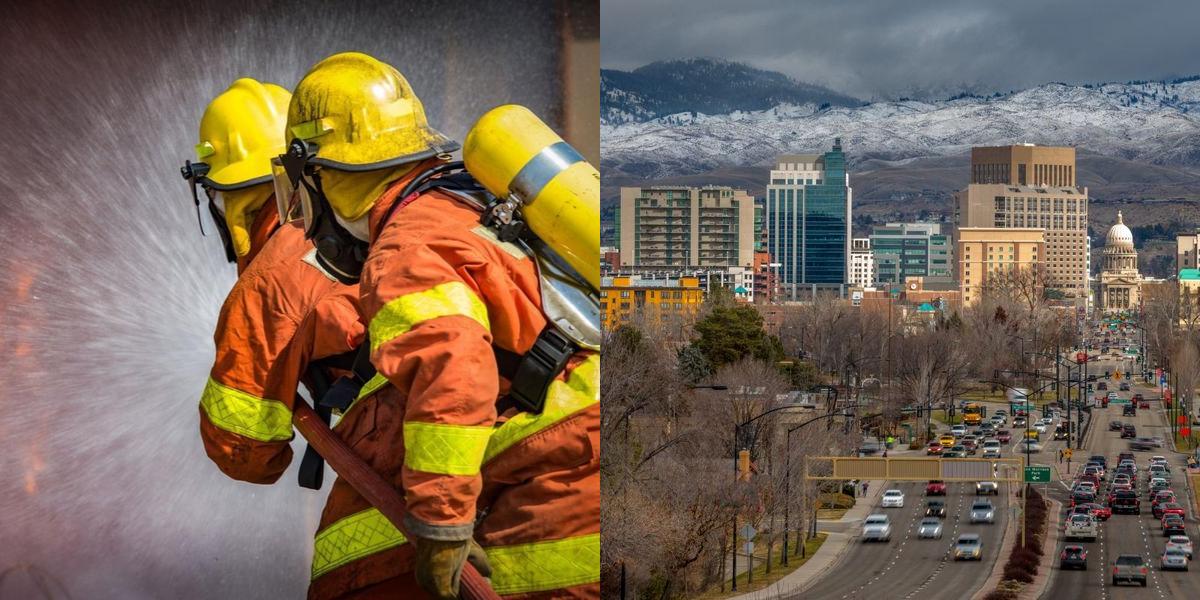How to Become a Firefighter in Idaho (2025)

If you are looking for a career that combines physical grit with community service, becoming a Firefighter in Idaho is one of the most rewarding paths you can choose. Whether battling structural fires in booming cities like Boise and Meridian or managing wildland fires in the rugged backcountry, Idaho firefighters are essential to public safety. The state employs over 1,700 career firefighters who earn a median salary of $53,860 per year, according to the U.S. Bureau of Labor Statistics. This guide provides the definitive 5-step process for navigating Idaho's specific EMT prerequisites and academy training to launch your career.
Where Can I Find Firefighter Classes in Idaho?
Dreambound simplifies the search for firefighter training programs. As the largest platform for vocational training, it allows you to compare courses based on location, cost, and duration.
Ready to explore your options? Visit the Dreambound website and kickstart your journey today.
How Long Does It Take To Become a Firefighter?
The time it takes to become a certified firefighter can vary depending on several factors, including the specific training program you choose and the requirements of the fire department in your area. However, most firefighter certification programs can be completed in approximately 6 to 12 months.
During this time, you will undergo rigorous training that includes both classroom instruction and hands-on practice. You will learn about fire behavior, emergency medical procedures, hazardous materials handling, search and rescue techniques, and more. You will also gain practical experience through simulated fire scenarios and supervised training exercises.
How do I get a job as a Firefighter?
Once you have obtained your firefighter certification, the next step is to find a job as a firefighter. Here are some steps you can take to increase your chances of landing a firefighter job:
1. Gain relevant experience: While completing your firefighter certification, try to gain as much relevant experience as possible. This could include volunteering with your local fire department, participating in community fire drills, or shadowing experienced firefighters. This experience will not only enhance your skills but also demonstrate your commitment to the profession.
2. Prepare a strong resume: When applying for firefighter jobs, it's important to have a well-crafted resume that highlights your skills, training, and experience. Make sure to include your firefighter certification, any relevant work experience, and any additional certifications or training you have obtained. Also, emphasize any leadership or teamwork skills you possess, as these are highly valued in the firefighting profession.
3. Network with firefighters: Building connections with current firefighters can be beneficial when searching for a job. Attend firefighter conferences, join professional organizations, and participate in community events where firefighters are present. Networking can help you learn about job openings and get recommendations from those already working in the field.
4. Prepare for the interview: Once you have applied for firefighter jobs, you may be called for an interview. Prepare for the interview by researching common interview questions and practicing your responses. Be sure to highlight your passion for firefighting, your ability to work under pressure, and your commitment to serving the community.
5. Stay physically fit: Firefighting is a physically demanding job, so it's important to stay in good physical shape. Maintain a regular exercise routine that includes cardiovascular exercises, strength training, and flexibility exercises. Many fire departments have physical fitness requirements, so being in good shape will increase your chances of passing these tests.
6. Be persistent: Landing a firefighter job can be competitive, so it's important to be persistent and not get discouraged if you don't get hired right away. Keep applying to different fire departments, attend job fairs, and consider volunteering or working part-time in a related field while you continue your job search. Persistence and perseverance will eventually pay off.
Career Paths and Opportunities after Becoming a Firefighter
Firefighting opens doors to various career paths:
-
Fire Officer: Lead teams and manage emergency responses.
-
Fire Investigator: Analyze and determine causes of fires.
-
Hazardous Materials Specialist: Handle dangerous materials safely.
-
Fire Inspector: Ensure buildings meet safety codes.
-
Emergency Medical Technician (EMT): Combine firefighting and medical response skills.
How Much does a Firefighter Make in Idaho?
The median salary for firefighters in Idaho is $50,720 per year, with higher wages for experienced professionals or those in specialized roles.
Frequently Asked Questions
How much does a Firefighter make in Idaho?
The median annual salary is $53,860. However, in competitive metro areas like Boise or Idaho Falls, starting salaries can be higher, often exceeding $60,000 with overtime and benefits.
Do I need to be a Paramedic?
No, but it helps. Most departments require EMT-Basic. However, being a licensed Paramedic makes you extremely competitive and often comes with a higher pay scale or hiring preference points.
Can I volunteer first?
Yes! About 56% of Idaho's fire departments are volunteer or mostly volunteer. Volunteering is an excellent way to get free training (departments will often pay for your Firefighter I and EMT classes) and gain experience while applying for career jobs.
Final Thoughts
A career as a firefighter isn’t just a job—it’s a commitment to saving lives, protecting property, and serving your community. If you’re ready to embrace this rewarding career, Dreambound can help you take the first step toward making a difference.
Considering a change in your career? We've gathered some perspectives to help you in your journey. You can explore several of these:

Vduani Martinez is a part of the Growth team at Dreambound. She creates and fixes workflows and automation to guarantee seamless operations. On top of that, she manages databases to ensure all information is up to date. Vduani is a licensed Electronics Engineer who loves coffee and is a travel enthusiast. Out of the office, she enjoys going on road trips and discovering new cafes and restaurants.




